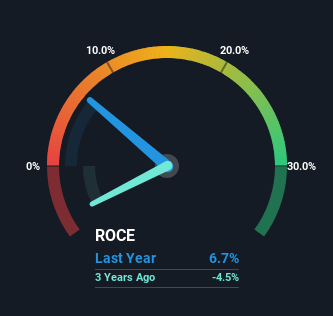- United Kingdom
- /
- Food
- /
- AIM:DKL
Returns On Capital Signal Tricky Times Ahead For Dekel Agri-Vision (LON:DKL)

If you're looking for a multi-bagger, there's a few things to keep an eye out for. Ideally, a business will show two trends; firstly a growing return on capital employed (ROCE) and secondly, an increasing amount of capital employed. Ultimately, this demonstrates that it's a business that is reinvesting profits at increasing rates of return. However, after investigating Dekel Agri-Vision (LON:DKL), we don't think it's current trends fit the mold of a multi-bagger.
What Is Return On Capital Employed (ROCE)?
For those who don't know, ROCE is a measure of a company's yearly pre-tax profit (its return), relative to the capital employed in the business. The formula for this calculation on Dekel Agri-Vision is:
Return on Capital Employed = Earnings Before Interest and Tax (EBIT) ÷ (Total Assets - Current Liabilities)
0.067 = €2.9m ÷ (€51m - €8.1m) (Based on the trailing twelve months to June 2022).
Thus, Dekel Agri-Vision has an ROCE of 6.7%. In absolute terms, that's a low return and it also under-performs the Food industry average of 8.7%.
See our latest analysis for Dekel Agri-Vision

In the above chart we have measured Dekel Agri-Vision's prior ROCE against its prior performance, but the future is arguably more important. If you're interested, you can view the analysts predictions in our free report on analyst forecasts for the company.
What Does the ROCE Trend For Dekel Agri-Vision Tell Us?
On the surface, the trend of ROCE at Dekel Agri-Vision doesn't inspire confidence. To be more specific, ROCE has fallen from 13% over the last five years. However, given capital employed and revenue have both increased it appears that the business is currently pursuing growth, at the consequence of short term returns. If these investments prove successful, this can bode very well for long term stock performance.
In Conclusion...
While returns have fallen for Dekel Agri-Vision in recent times, we're encouraged to see that sales are growing and that the business is reinvesting in its operations. And there could be an opportunity here if other metrics look good too, because the stock has declined 59% in the last five years. As a result, we'd recommend researching this stock further to uncover what other fundamentals of the business can show us.
On a final note, we found 5 warning signs for Dekel Agri-Vision (1 is concerning) you should be aware of.
For those who like to invest in solid companies, check out this free list of companies with solid balance sheets and high returns on equity.
If you're looking to trade Dekel Agri-Vision, open an account with the lowest-cost platform trusted by professionals, Interactive Brokers.
With clients in over 200 countries and territories, and access to 160 markets, IBKR lets you trade stocks, options, futures, forex, bonds and funds from a single integrated account.
Enjoy no hidden fees, no account minimums, and FX conversion rates as low as 0.03%, far better than what most brokers offer.
Sponsored ContentNew: Manage All Your Stock Portfolios in One Place
We've created the ultimate portfolio companion for stock investors, and it's free.
• Connect an unlimited number of Portfolios and see your total in one currency
• Be alerted to new Warning Signs or Risks via email or mobile
• Track the Fair Value of your stocks
Have feedback on this article? Concerned about the content? Get in touch with us directly. Alternatively, email editorial-team (at) simplywallst.com.
This article by Simply Wall St is general in nature. We provide commentary based on historical data and analyst forecasts only using an unbiased methodology and our articles are not intended to be financial advice. It does not constitute a recommendation to buy or sell any stock, and does not take account of your objectives, or your financial situation. We aim to bring you long-term focused analysis driven by fundamental data. Note that our analysis may not factor in the latest price-sensitive company announcements or qualitative material. Simply Wall St has no position in any stocks mentioned.
About AIM:DKL
Dekel Agri-Vision
Through its subsidiaries, develops and cultivates palm oil plantations in the Republic of Cote d’Ivoire.
Good value low.
Similar Companies
Market Insights
Community Narratives



